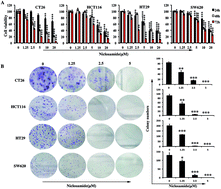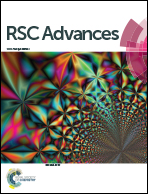Niclosamide induces colorectal cancer apoptosis, impairs metastasis and reduces immunosuppressive cells in vivo
Abstract
Colorectal cancer (CRC) is one of the most common malignancies with considerable metastatic potential, explaining the need for new candidates that inhibit tumor growth and metastasis. Constitutive activation of signal transducers and activator of transcription 3 (Stat3) signaling promote tumorigenesis through disordering of the expression of key genes, and is associated with CRC progression. In this study, niclosamide, an FDA approved anthelmintic drug identified as a potent inhibitor of Stat3, was assessed for its anti-CRC activities in vitro and in vivo. We showed that niclosamide significantly inhibited proliferation in four CRC cell lines. In addition, the apoptosis was also found after treatment with niclosamide, which was related with the up-regulation of cleaved-caspases-3 and Bax but the down-regulation of Bcl-2 and the loss of mitochondrial membrane potential (ΔΨm) in CT26 cells. Moreover, niclosamide potently suppressed cell migration and invasion in a dose-dependent manner. Furthermore, our study showed that the administration of niclosamide in vivo markedly inhibited the number of tumor nodules in the abdomen metastasis model of colon cancer. The antitumor effect of niclosamide was correlated with a marked decrease in the number of MDSCs in tumor. Interestingly, niclosamide also suppressed the activation of FAK, Stat3 and the expression of matrix metalloproteinase MMP9. Taken together, these findings indicated that niclosamide might be a candidate drug for impairing the metastasis of colon cancer in part by inhibiting the activation of Stat3.


 Please wait while we load your content...
Please wait while we load your content...